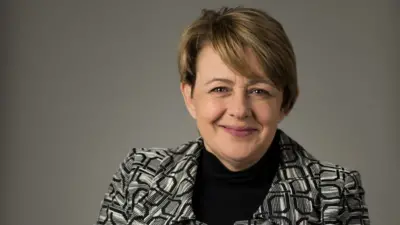We've updated our Privacy and Cookies Policy
We've made some important changes to our Privacy and Cookies Policy and we want you to know what this means for you and your data.
Audit Office criticises special need pupil support
Image source, Getty Images
- Author, Robbie Meredith
- Role, 91ČČąŹ News NI Education Correspondent
The Department of Education cannot demonstrate it is providing effective support to more than 75,000 children with special educational needs (SEN).
That is one of the key findings of an Audit Office (NIAO) report.
It also found only one in five SEN statements were completed within the recommended 26 weeks in 2015-16.
The NIAO concluded that neither the department nor the Education Authority (EA) could ensure they were achieving "best outcomes" for children with SEN.
The report also said that, although it cost ÂŁ55m to provide classroom assistants for children with statements of SEN - documents that set out the specific help they require in school - their support may not be effective.
Classroom assistants
"The provision of a classroom assistant is often considered as a key form of support given to children with a statement of SEN yet their impact, or that of any other support provided, has not been evaluated at a strategic level," the report said.
The term "special educational needs" is defined as a "learning difficulty which calls for special provision to be made".
There were 76,300 children with SEN in Northern Ireland's schools in 2016/17, 22% of the entire school population.
It costs more than ÂŁ250m annually to provide help for them, most of which comes from the EA budget.
The vast majority are educated in mainstream schools, and it was their situation the NIAO report concentrated on.
About 17,000 children with the most significant needs have a statement of SEN.
Delays
The EA is required to complete an assessment and statement in 26 weeks, but the NIAO found there were delays at all stages of the assessment process.
As a result, almost 80% of new statements issued in 2015-16 took longer than the statutory 26-week time limit.
According to the EA, the majority of delays were because of difficulty in getting information from health trusts on time.
It cost ÂŁ80m to provide specific help for pupils with statements in 2015-16 - a 45% rise in costs since 2011-12.
The NIAO said some schools were very good at providing help for pupils with SEN, and cited a number of examples of good practice.
These included the High School, Ballynahinch and St Paul's High School in Bessbrook as well as Lagan College and Aquinas Grammar in Belfast.
However, it said there was not a consistent approach across all schools.
The report did acknowledge that a greater proportion of children with SEN were leaving school with GCSEs or A-Levels and fewer were leaving school with no qualifications.
In conclusion, the comptroller and auditor general Kieran Donnelly said neither the DE nor EA could ensure they were achieving the best outcomes for children with SEN.
"Neither the department nor the Education Authority can currently demonstrate value for money in terms of economy, efficiency or effectiveness, in the support to children with special education needs in mainstream schools," he said.
"It is therefore crucial that the department and the EA assess the quality of support provided by formally evaluating it in terms of the progress made by children.
"This will allow resources to be focused on the types of support which maximise progress and improve outcomes."
Top Stories
More to explore
Most read
Content is not available








